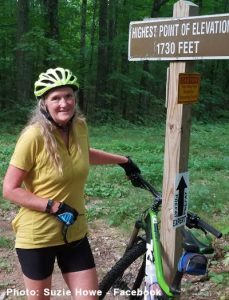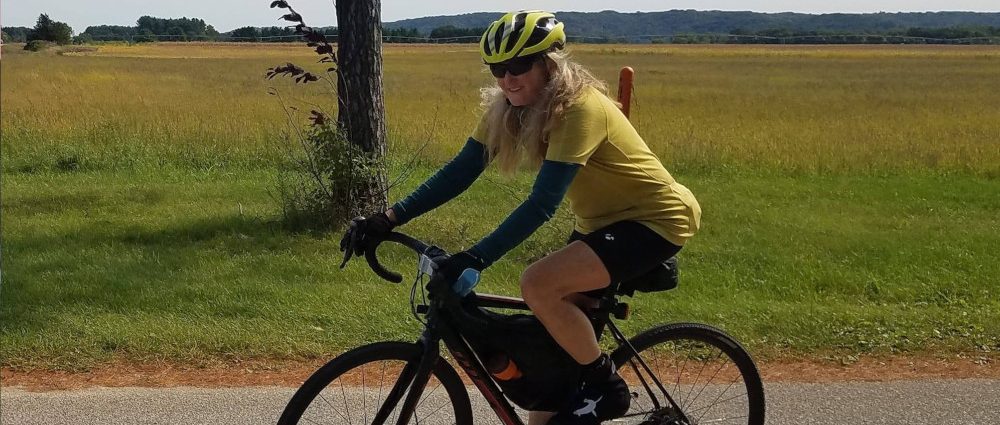By Erica Howe –
 Suzie Howe
Suzie Howe
“People of the Driftless”
The Driftless Area is home to a varied population. It is hard to find any one person who embodies all that this area stands for, but we may have come close with Suzie Howe. Suzie was not born in the Driftless area, nor did she grow up here; she has, however, embraced everything Driftless with open arms. It was a map from National Geographic that brought Suzie and her husband Jon to the Driftless area. Suzie had grown up in Columbus, Indiana, a town of 50,000, while Jon was raised in a suburb of Chicago, and both wanted to live rurally. The map that so interested them was a map of light pollution in the United States. The relative darkness in the Driftless area called to them as a natural place where they could raise a family. With hills for hiking, trails for cross-country skiing and mountain biking, the Driftless area had what they were looking for. Which was not to say that they only saw the enchanting parts of the area; in fact, while home-hunting on their honeymoon, they found many roads impassable due to flooding, and most apartments they looked at had no appliances.
It was a map from National Geographic that brought Suzie and her husband Jon to the Driftless area. Suzie had grown up in Columbus, Indiana, a town of 50,000, while Jon was raised in a suburb of Chicago, and both wanted to live rurally. The map that so interested them was a map of light pollution in the United States. The relative darkness in the Driftless area called to them as a natural place where they could raise a family. With hills for hiking, trails for cross-country skiing and mountain biking, the Driftless area had what they were looking for. Which was not to say that they only saw the enchanting parts of the area; in fact, while home-hunting on their honeymoon, they found many roads impassable due to flooding, and most apartments they looked at had no appliances.
Part of the reason that Suzie and Jon wanted to live rurally was for their children, Erica and Trevor. Not only did they want their kids to have a big backyard (the property they ended up buying was 40 acres), but because of the educational opportunities. The Driftless area is full of different ideas of teaching, from public schools to different types of homeschooling philosophies to Waldorf and Montessori thoughts. Viroqua public school also has a good student-to-teacher ratio, so that there can be individualized education. The area also had something for both of their kids, whom Suzie encouraged to engage in extracurriculars in the community; Erica was interested in the arts, and Trevor was a sports boy. For Erica there were the school programs, the community theatre, local shops, individuals who taught instruments, and a local group called the Driftless Folk School that offered classes in various skills. For Trevor, there were school sports, biking opportunities set out by the local bike shop, and he even took advantage of the local options in learning guitar. Both kids grew up healthy thanks to the family’s backyard garden and the ample exercise afforded them by their home.
As a social worker assisting adults with mental health difficulties, Suzie quickly became entrenched in the community of Viroqua, Wisconsin, where she worked. A problem she has had to push against during her career with The Family and Children’s Center is her clients’ housing situations. Homelessness is a large problem in rural areas, where rent is sometimes too expensive for subsidies to help. Public housing can also be difficult for her clients because the rules and regulations of public housing can make it difficult for people with mental illness to keep an apartment. And, as she pointed out in a recent article in the local newspaper ‘The Vernon County Broadcaster’, even someone making ten dollars an hour could not afford an apartment in the Viroqua area, where you rarely see a one-bedroom for less than $600 a month, and that’s without utilities. And even apart from housing, it’s nearly impossible to get around in a rural area without a car, which then adds another payment if a person cannot walk to work.
Viroqua is fortunate, Suzie says, in having very good health care from the Vernon Memorial Hospital located in town. Still, there is a stigma about mental health in rural areas which makes it difficult for people with mental health issues to be a part of the community. One way in which Suzie helps to battle this social ostracization is through the recovery program known as ‘The Other Door’. When a group of people in the community including medical professionals and former addicts noted that there was a need for a place for those recovered and recovering to go and have a positive atmosphere, they asked if the Family and Children’s Center could find some space. They could. So Suzie worked to obtain a venture grant, and, through working with United Way, private donors, and Vernon County, has been able to secure funding. Suzie has been running ‘The Other Door’ since 2013. It has over 5,000 visitors a year, runs over 600 groups per year including the National Alliance on Mental Illness, NA, AA, LGBT support, chronic wellness, and general sharing. Family and Children Center makes the space available to any recovery-oriented group that needs space for meetings.
Suzie is also a driving force in the sports of Viroqua. Not only does she enjoy participating in 5ks, triathlons and other sports, she coaches as well. Her first experience came about not because she was interested in coaching, but because she wanted her children to have a good experience playing soccer in the local park and rec program. What she found in Viroqua was one very dedicated man on the field with sixty children. So she took it upon herself to organize the program for the next six years, while her children were in the program. Since she had played and enjoyed soccer in her childhood, Suzie enjoyed the coaching, but experienced frustration in the administrative aspects, especially finding other coaches. Parents of players and personal friends were always the first calls, and once in a while a high school park and rec employee would take on a few of the teams. And once Driftless United Soccer started their programs for middle and high schoolers, some of her students started playing soccer against other areas’ teams. Soccer is a rising part of Driftless culture, and Suzie certainly had a hand in that in the Viroqua area.
Her coaching didn’t end there; she is currently helping to coach the local NIKA team, a team of middle and high school mountain bikers. She’s enjoyed mountain biking since she learned how in order to bike with her son, who showed an interest. Since starting on the mountain biking path, Suzie has involved herself in the community, even counseling at a weekend camp for mountain biking put together by the local bike shop every summer. She enjoys coaching NIKA partially because the administrative side is mostly taken care of by the local bike shop owner Pete who also coaches, and because it is easy to find the necessary coaches for the team.
Suzie also takes time for herself. She enjoys knitting and weaving along with soap, cheese, and lotion making. She also cooks many of the meals her family eats, and spends much of fall canning and otherwise preserving food from the garden she enjoys working on. Living in the Driftless area has been a learning experience for her, since much of what she enjoys now are not things she knew how to do before moving here. She took classes to learn to make cheese and bread, and also how to weave baskets with willow-branches through the Driftless Folk School. She took classes on knitting at the local knit shop. Living in the Driftless has been a fulfilling experience for her, and she hopes that more young couples will settle in the area because, as she says, vibrant citizens make for vibrant businesses and a vibrant community.

